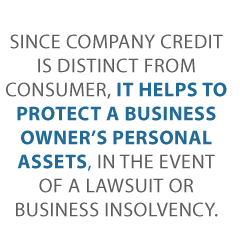Do you know how to improve business credit score? Does your small business have a good business credit score? Is there room for improvement?
So you are currently in business, and you are striving to keep on top of your company credit scores. Or perhaps you aren’t, and have determined now is a good time to start. Or maybe your company is fairly new, and this is the very first time you’re doing this. Despite your scenario, you have probably asked this question at least once – are my credit scores any good? And what’s the best way how to improve business credit score?
Let’s check out how to improve business credit score and solve this mystery at last. And that means talking about building business credit.
Every Small Business Needs to Know How to Improve Business Credit Score
Small business credit is credit in a business’s name. It doesn’t link to an entrepreneur’s consumer credit, not even when the owner is a sole proprietor and the solitary employee of the company.
Accordingly, an entrepreneur’s business and personal credit scores can be very different.
The Advantages
Since company credit is distinct from consumer, it helps to protect a business owner’s personal assets, in the event of a lawsuit or business insolvency.
Also, with two separate credit scores, a business owner can get two separate cards from the same vendor. This effectively doubles purchasing power.
Another advantage is that even startup companies can do this. Going to a bank for a business loan can be a recipe for disappointment. But building company credit, when done correctly, is a plan for success.
Consumer credit scores are dependent on payments but also other components like credit usage percentages.
But for business credit, the scores truly merely depend on whether a small business pays its invoices in a timely manner.
The Process
Building business credit is a process. It does not happen automatically. A business has to actively work to build business credit.
That being said, it can be done easily and quickly, and it is much more rapid than establishing consumer credit scores.
Vendors are a big aspect of this process.
Accomplishing the steps out of order causes repetitive rejections. Nobody can start at the top with business credit.
Business Fundability
A company must be fundable to credit issuers and merchants.
As a result, a small business needs a professional-looking web site and email address. And it needs to have website hosting bought from a vendor like GoDaddy.
And also, company telephone numbers need to have a listing on 411. You can do that here: https://www.listyourself.net.
At the same time, the business phone number should be toll-free (800 exchange or similar).
A small business also needs a bank account devoted purely to it, and it needs to have all of the licenses necessary for running.
How to Improve Business Credit Score by Getting All Your Licenses
These licenses all have to be in the specific, accurate name of the small business. And they need to have the same small business address and telephone numbers.
So, bear in mind, that this means not just state licenses, but potentially also city licenses.
How to Improve Business Credit Score by Working with the IRS
Visit the Internal Revenue Service website and get an EIN for the small business. They’re free of charge. Choose a business entity like corporation, LLC, etc.
A business may begin as a sole proprietor. But they absolutely need to change to a variety of corporation or an LLC.
This is to diminish risk. And it will take full advantage of tax benefits.
A business entity matters when it concerns tax obligations and liability in the event of litigation. A sole proprietorship means the business owner is it when it comes to liability and taxes. Nobody else is responsible.
The best thing to do is to incorporate. You should only look at a DBA as an interim step on the way to incorporation.
Starting Off the Business Credit Reporting Process
Begin at the D&B website and get a totally free D-U-N-S number. A D-U-N-S number is how D&B gets a business into their system, to produce a PAYDEX score. If there is no D-U-N-S number, then there is no record and no PAYDEX score.
Once in D&B’s system, search Equifax and Experian’s web sites for the small business. You can do this at www.creditsuite.com/reports. If there is a record with them, check it for accuracy and completeness. If there are no records with them, go to the next step in the process.
By doing so, Experian and Equifax have something to report on.
https://creditsuite.wistia.com/medias/1rpvzn0f8n?embedType=async&videoFoam=true&videoWidth=640
Vendor Credit Tier
First you ought to build trade lines that report. This is also known as the vendor credit tier. Then you’ll have an established credit profile, and you’ll get a business credit score.
And with an established business credit profile and score you can begin to get more credit.
These types of accounts tend to be for the things bought all the time, like marketing materials, outdoor workwear, and office furniture.
But to start with, what is trade credit? These trade lines are credit issuers who give you starter credit when you have none now. Terms are usually Net 30, rather than revolving.
Therefore, if you get an approval for $1,000 in vendor credit and use all of it, you need to pay that money back in a set term, such as within 30 days on a Net 30 account.
You want 5 to 8 of these to move onto the next step. Here are some stellar choices from us: https://www.creditsuite.com/blog/5-vendor-accounts-that-build-your-business-credit/
How to Improve Business Credit Score by Monitoring Your Business Credit
Know what is happening with your credit. Make certain it is being reported and attend to any mistakes as soon as possible. Get in the habit of checking credit reports and digging into the particulars, and not just the scores.
We can help you monitor business credit at Experian, Equifax, and D&B for only $24/month.
How to Improve Business Credit Score by Updating Your Data
Update the details if there are errors or the info is incomplete. At D&B, you can do this at: https://iupdate.dnb.com/iUpdate/viewiUpdateHome.htm. For Experian, go here: www.experian.com/small-business/business-credit-information. So, for Equifax, go here: www.equifax.com/business/small-business.
How to Improve Business Credit Score by Fixing Errors in Your Report
So, what’s all this monitoring for? It’s to dispute any inaccuracies in your records. Errors in your credit report(s) can be taken care of. But the CRAs often want you to dispute in a particular way.
Get your small business’s PAYDEX report at: www.dnb.com/about-us/our-data.html. Get your company’s Experian report at: www.businesscreditfacts.com/pdp.aspx?pg=SearchForm. And get your Equifax business credit report at: www.equifax.com/business/credit-information.
How to Improve Business Credit Score with Disputes
Disputing credit report inaccuracies generally means you mail a paper letter with duplicates of any proof of payment with it. These are documents like receipts and cancelled checks. Never send the originals. Always send copies and retain the original copies.
Fixing credit report errors also means you precisely itemize any charges you dispute.
A Word about How to Improve Business Credit Score
Always use credit responsibly! Never borrow beyond what you can pay back. Track balances and deadlines for payments. Paying off on schedule and in full does more to boost business credit scores than pretty much anything else.
Building small business credit pays. Good business credit scores help a company get loans. Your loan provider knows the company can pay its debts.
The small business’s EIN links to high scores and lending institutions won’t feel the need to call for a personal guarantee.
How to Improve Business Credit Score: Takeaways
Business credit is an asset which can help your small business for many years to come. Learn more here and get started toward growing company credit.

